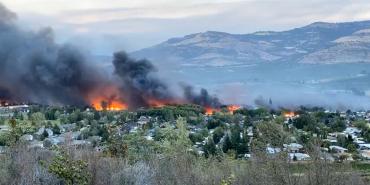Confronting the climate crisis was the focus of the AFT’s town hall on Oct. 8. The fires in the West and the hurricanes in the South are raising public awareness about climate change, but it’s time to match public awareness with public action, said AFT President Randi Weingarten during the event. “Climate change is real. It’s caused by humans, it’s already doing significant damage, and we need to act,” she said, adding that the climate crisis should be a central issue in the election.
Weingarten was joined in the town hall discussion by Sen. Ed Markey (D-Mass.); Heather McGhee, the board chair of Color of Change; and Alex Morrison, an organizer with the Sunrise Movement.
Confronting the climate crisis is critical because, like the COVID-19 pandemic and the recession, climate issues affect people unequally, said Weingarten, who added that issues of pollution, climate-related illnesses like asthma and failing infrastructure disproportionately affect communities of color as well as low-income and working-class communities. “The systemic racism and injustice that manifest itself in this space is real. We can’t tackle climate change without confronting environmental injustice.”
Weingarten also pointed out that the fight for a sustainable climate will create the opportunity for new jobs with the establishment of a green economy. “There is a way for us to take this thing and actually make this the ‘New Deal’ of the 21st century. We have done big things before in the United States. We need to do this for our future, and we need to do this in a way that never pits jobs versus the environment.”
Even though the Trump administration has chosen not to lead on the climate issue and has attacked the Green New Deal, there are “millions of young people across the country walking out of school and going on strike saying, ‘I’m a part of Generation GND,’” said McGhee. “This issue is not just about the future. Climate change is here now, and it’s already costing us. We are already bearing too high a cost just to support old technology that is no longer serving our needs.”
McGhee said that while Joe Biden and Kamala Harris may not entirely endorse the Green New Deal, they are committed to addressing climate change. “What’s most important is that if you look at the details, the investment, industrial policy, manufacturing, green new jobs, the commitment to 100 percent green energy and zero emissions by 2050, it’s all there,” she said, adding, “we can fill in the details with our movement-building and create the kind of future that nurtures our children and that gives them the planet they deserve.”
Markey worked with Rep. Alexandria Ocasio-Cortez (D-N.Y.) to introduce the Green New Deal legislation in Congress last February. “Nothing has been the same since then. We immediately drew the wrath of Fox News. We drew the wrath of Donald Trump, the fossil fuel industry, all saying, ‘What have they done? It looks like socialism.’”
Markey compared the 2020 election with 2016, when not one question was asked about climate change. “The Green New Deal solved that problem,” said Markey. “Everyone’s got a view on it now. Everyone has their own version of a plan, and that’s the goal: to lift people’s gaze to the constellation of possibilities and our ability to confront this climate crisis that is affecting us.”
Markey believes the country is at a turning point. “Environmental justice is on the ballot, the Paris climate accord is on the ballot, the Green New Deal is on the ballot, and the same thing is true for educational justice, healthcare justice and economic justice. We have this incredible opportunity to have a revolution—to change the direction of the planet.”
Morrison, an organizer with the Sunrise Movement, a youth-led organization that advocates for climate change, and a member of Service Employees International Union Local 1021 in Oakland, shared how watching Hurricane Katrina tear through New Orleans as a 13-year-old motivated him to get involved. “I saw firsthand the way that climate change and systemic racism and all of these other issues are interconnected. And I know as a young person, that’s what energized me to get involved.”
Morrison said the inability to address the challenges our country face with climate change and systemic racism “sheds light on the fact that the era of incrementalism needs to end. Our leaders need to be taking bold, big steps and not half measures.”
He believes movement-building is key to addressing our challenges. “We know that it’s about movements at the end of the day. What we’ve seen over this year with uprisings across the country, people pouring into the streets calling for justice and all the gains that we’ve had in pushing climate as an intersectional issue—[they] don’t just happen out of nowhere. It’s the result of people movement-building and countless people willing to envision a future that’s radically different from what they see around them right now and demonstrating a willingness to fight for it.”
[Adrienne Coles]

